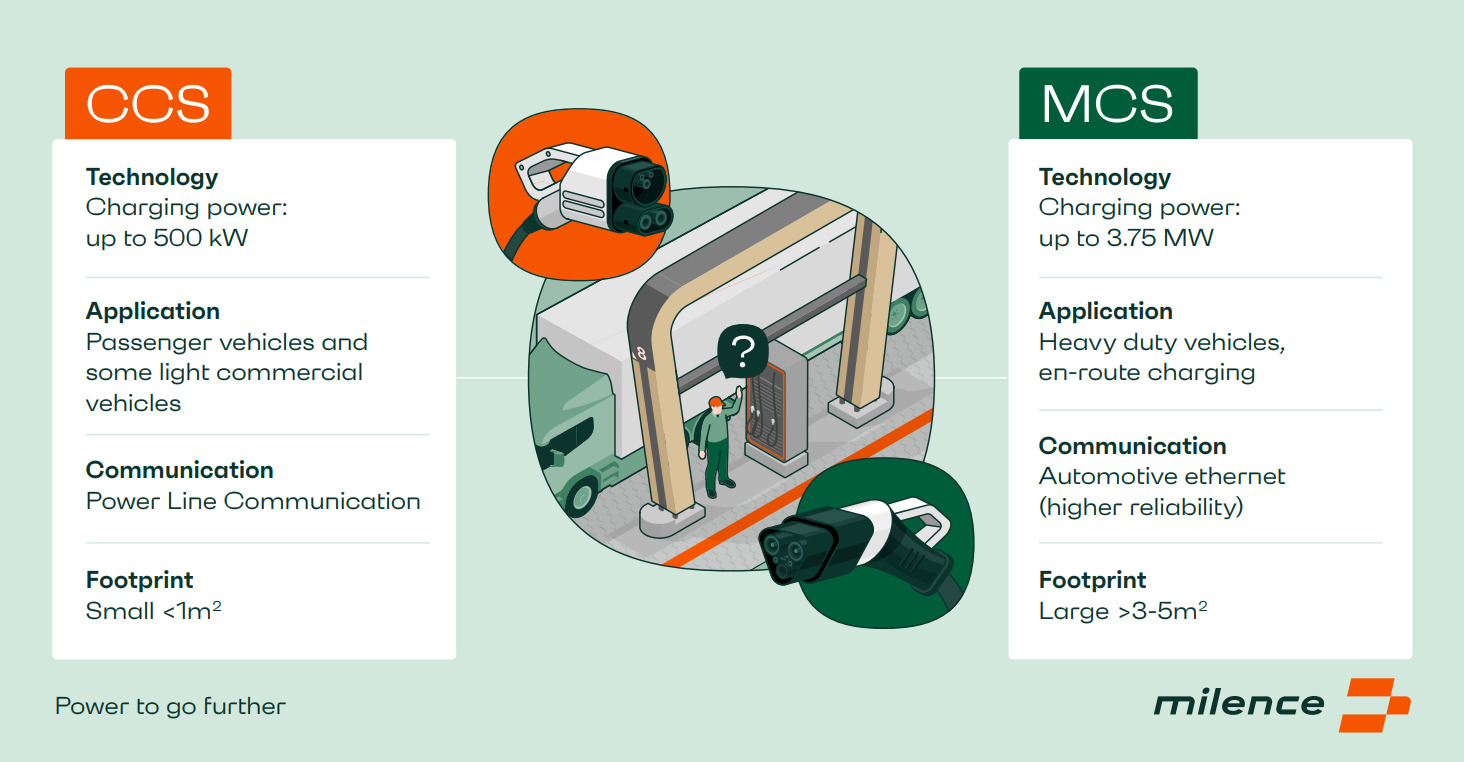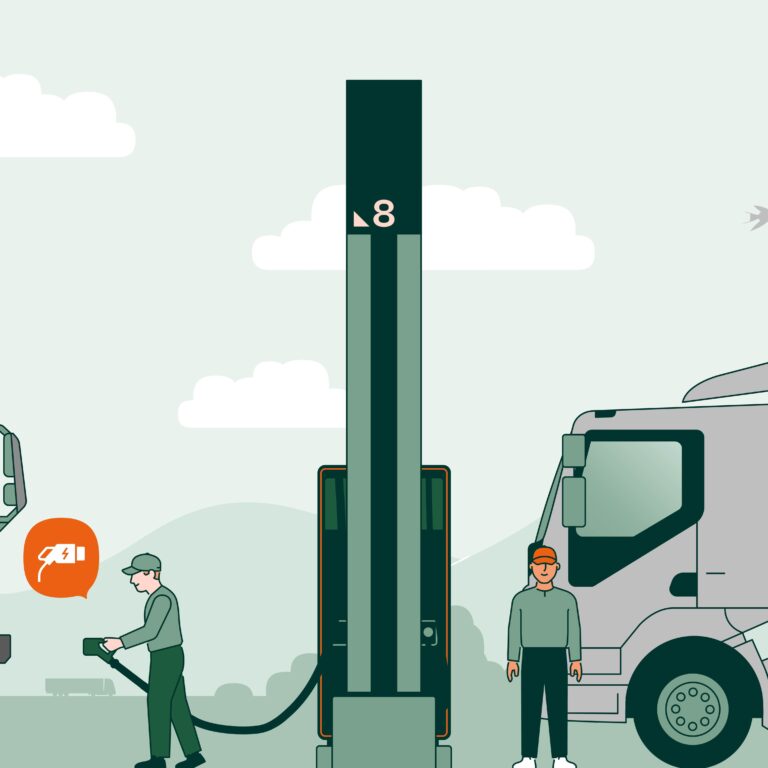The battery electric heavy-duty truck industry is growing rapidly driven by technology developments in both the battery and charger technology and the growing demand for zero emission transportation solutions. In this article, we explore the expected transition from the current CCS (Combined Charging System) to the MCS (Megawatt Charging System) charging standards, shedding light on the key differences, industry implications, and the role of Milence in shaping this transformation.
The Challenges with Traditional Charging
For a long time, the Combined Charging System (CCS) was prominent in the EV charging landscape. It was highly regarded for its adaptability, making it suitable for a range of vehicles. However, as the electric heavy-duty truck sector grew, CCS’s constraints started to surface.
Heavy-duty trucks require substantial more energy than standard passenger vehicles. Those behemoths need so much energy that the charging times at CCS power levels would take too long.

CCS vs MCS: Bridging the Gap in Charging Standards
The Megawatt Charging System is designed with commercial trucks and other high-power applications in mind and aims to address the limitations of CCS by pushing the boundaries of charging capabilities as well as improving communication. With the capacity to handle up to 3000A, MCS will become the primary standard for long-haul trucks, airplanes, and other commercial vehicles. Its higher power output makes it an ideal choice for applications where time-sensitive charging is crucial.
Additionally, according to a recent whitepaper published by CharIN, MCS also offers improved robustness of communication, which will reduce the downtime related to failed charging events.
Introducing MCS Charging:
Faster Charging Times: MCS can deliver up to ~3.5 MW of power, drastically reducing the charging time for large battery packs. While a CCS might take hours to charge a truck, MCS can accomplish the task in a fraction of that time.
Greater Efficiency: The technology behind MCS is not only about speed. It’s designed for efficiency, ensuring that the maximum amount of energy gets transferred to the vehicle’s battery with minimal losses.
Safety: With great power comes the need for enhanced safety measures. MCS is equipped with advanced cooling systems to handle the rapid energy transfer, ensuring the safety of both the equipment and the vehicle.
The Impact on the Industry
The advantages of MCS are not just technological; they have far-reaching implications for the heavy-duty trucking industry:
Operational Efficiency: Shorter charging times mean trucks spend only the mandatory rest time at charging stations without any impact on current operational times. This can translate to an easier transition for trucking companies.
Expanding Infrastructure: As more companies recognise the benefits of MCS, we’re likely to see an expansion in MCS charging infrastructure. This will further push the adoption of electric heavy-duty trucks as range anxiety diminishes.
Environmental Benefits: With efficient and rapid charging, electric heavy-duty trucks can become a viable replacement for their diesel counterparts. This transition will significantly reduce greenhouse gas emissions from one of the major contributors to environmental pollution. Furthermore, all predictions clear point at the fact that within the next few years, EV trucks will surpass diesel trucks in cost-effectiveness, marking a significant shift in the transportation industry.
The Road Ahead
MCS is still in its nascent stages, but its potential is undeniable. Stakeholders from all corners of the electric vehicle and energy sectors are taking note. Collaborative efforts are underway to establish MCS as a universal standard, ensuring compatibility and fostering adoption.
Challenges remain, of course. The initial investment in MCS infrastructure is significant, and there’s a need for a global regulatory framework. But the momentum is clear. As technology evolves, megawatt power charging will be a key piece in the puzzle of sustainable heavy-duty transportation.
Milence’s Approach: Leading the Charge
Milence is committed to delivering top-notch charging solutions on both CCS and MCS fronts. On CCS, the company collaborates with trusted partners like Kempower and Alpitronic to provide reliable, high-power charging options.
Milence’s ambition is clear: to accelerate the market by providing innovative solutions that meet the evolving needs of commercial vehicle operators. By embracing MCS and innovating within the CCS framework, Milence is poised to shape the future of heavy-duty vehicle charging. To make this a reality, our technology team is working closely with various partners to ensure that Milence has the best charging solutions for its network facilitating rapid market adoption of sustainable road transport.
Conclusion
The transition from CCS to MCS charging standards marks a significant milestone in the electric vehicle industry’s evolution. With MCS offering higher power and greater reliability, it is set to become the standard of choice for commercial applications, including long-haul trucks and airplanes.
Milence’s commitment to delivering the best charging solutions on both CCS and MCS fronts highlights the importance of supporting both standards during this transitional phase. As the industry continues to innovate and adapt, Milence is at the forefront, driving change and accelerating the adoption of the most reliable and efficient charging solutions, while also focusing on sourcing green energy to ensure its cutting-edge technology contributes to environmental sustainability.
For more information on MCS, you can refer to the white paper by CharIN here. Additionally, for technical insights into MCS communication protocols, you can visit this link.
Our technology team here at Milence is also happy to answer any questions. Stay tuned for further developments.



